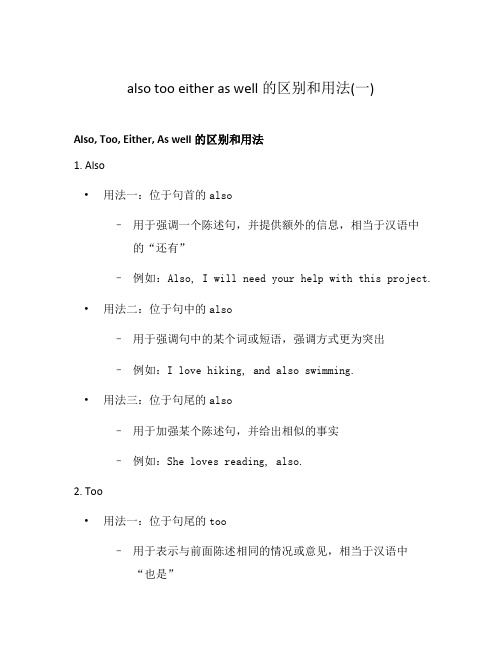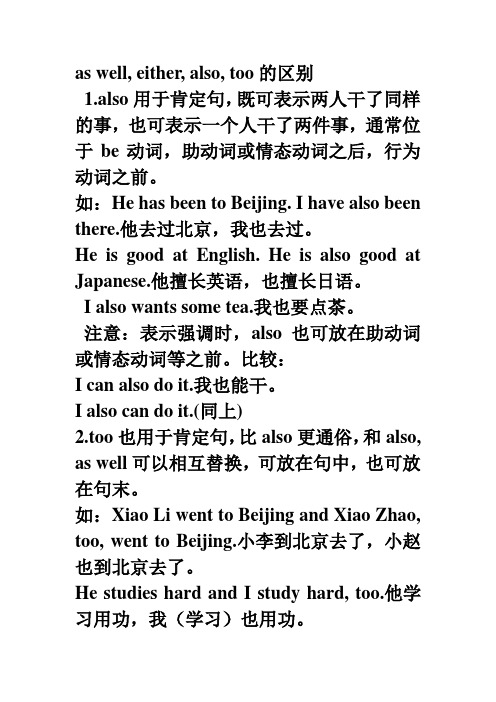either与too的用法区别
also too either as well的区别和用法(一)

also too either as well的区别和用法(一)Also, Too, Either, As well的区别和用法1. Also•用法一:位于句首的also–用于强调一个陈述句,并提供额外的信息,相当于汉语中的“还有”–例如:Also, I will need your help with this project. •用法二:位于句中的also–用于强调句中的某个词或短语,强调方式更为突出–例如:I love hiking, and also swimming.•用法三:位于句尾的also–用于加强某个陈述句,并给出相似的事实–例如:She loves reading, also.2. Too•用法一:位于句尾的too–用于表示与前面陈述相同的情况或意见,相当于汉语中“也是”–例如:I am tired, too.•用法二:位于句中的too–用于强调句中某人或某物和其他人或物一样–例如:He, too, has a dog.3. Either•用法一:位于句尾的either–用于在否定句中表示两种选择中的任何一种–例如:I don’t like tea, either.•用法二:either…or…–用于表示两种选择之间的关系,相当于汉语中的“要么…要么…”–例如:You can either study or play games.4. As well•用法一:位于句尾的as well–用于表示除了前面提到的情况之外,还有另外一项–例如:I like cooking and gardening as well.•用法二:as well as–用于列举一系列事物时,表示“还有…以及…”–例如:He is good at playing soccer as well asbasketball.以上是also, too, either, as well的常见用法及区别。
通过合理运用这些词语,可以使你的表达更加准确明确。
either和too和also和so的区别

either,too,also,so这四个词都是副词,都含有 也的意思,可是它们的具体含义和用法却有比较明显的区别。
只能用在否定句中,常常和否定词not连用,用来否定词组或句子,其含义表示 也不 ,在一般情况下只能放在句末来加强整个句子的语气。
例如: She isn t likely to agree,either.她也不会同意的。
won t be in and won t (be) either.格林先生不在,史密斯先生也不在.表示 也 还 而且 ,常表示与某人做同样的事,也常用于非正式语体或口语中。
too通常放在句末或单词、词组之后,其语气较轻。
在句子中,too用作插入语时,前后应用逗号隔开,此时too与also可以替换。
too放在句末,表示强调谓语或宾语,当too放在形容词、副词之前,其含义表示 太 过于 ,too 的用法比also更多些。
如: He can sing and dance, too.他会唱歌,也会跳舞。
That skirt is abit too short forher daughter.那条裙子对她女儿而言是太短了点儿。
You,too,may have a try.你也可以试一试。
Too the children will find in the book a lot of interesting pictures. 孩子们还能在书里面看到许多有趣的图片。
They also work in the hospital.=They work in the hospital,too.他们也在医院工作.3.在书面语里,also比too较为正式,also的语气较强,它的含义是 而且......还表示 此外还 也等含义,有时 also也表示 同样地的含义。
在口语中,also可以和too替换使用,但是,要注意also和too在句子中的位置不同。
also和常用的副词在句子中的位置相同,一般放在实意动词之前或系动词之后,有时放在整个谓语动词之前,有时也放在句首或句末用来修饰整个句子。
also,as well,too,either

also,as well,too,either
1. also: 用于肯定句,放在句中,位于系动词或助动词之后,谓语动词之前。
如:
John also plays the piano.约翰也弹钢琴。
His wife went abroad last year and he will also go abroad.他妻子去年出国,他也要出国。
2. as well用于肯定句,一般放在句末。
如:
He speaks French,and English as well.他既能说法语,也能说英语。
I am going to London and my sister is going as well(=going,too).
我要到伦敦去,我妹妹也要去。
3. too用于肯定句中,一般放在句末。
和as well一样。
如:
—I want to eat an apple.我想吃个苹果。
—Me too.我也想吃。
4. either用于否定句中,一般放在句末,肯定句变否定句时,其中的also和too等要改成either.如:
I don't watch TV,either.我也没看电视。
He won't go,either.他也不会去。
also, too, either, as well的区别

also, too, either, as well的区别这四个副词均可表示“也”,区别如下:1.too 和as well 多用于口语中,语气较轻,通常用于肯定句或疑问句,一般不用于否定句,且通常放在句末。
如:I like you too [as well]. 我也喜欢你。
Are they coming too [as well]? 他们也来吗?too 有时也紧跟在主语后(注:as well 不这样用),此用法较正式。
如:I, too, know where he lives. 我也知道他住在什么地方。
在Me too, You too 这类简略答语中,通常不用as well, also。
如:A:I’m tired. 我累了。
B:Me too. 我也是。
as well意为“也,又,而且”,意思等同于too,also,但as well只能置于句末。
He speaks English and Spanish as well.他既能说英语, 也能说西班牙语。
There may be travel expense, as well.可能还有旅途费用。
Are they coming as well?他们也来吗?as well也, 还有He speaks English and Spanish as well.他既能说英语, 也能说西班牙语。
2.also 比too 和as well 正式,一般也不用于否定句,它在句中的位置通常是紧靠动词,即放在行为动词之前,特殊动词之后。
有时为了强调也放在句末(但不常见)。
如:He also came. / He came also. 他也来了。
She is young and beautiful,and also rich. 她年轻漂亮,而且有钱。
also 有时用于句首(其后通常有逗号),相当于连词and。
如:Also,his mother was dead. 再说,他母亲又过世了。
as well,either,also,too的区别doc

as well, either, also, too的区别1.also用于肯定句,既可表示两人干了同样的事,也可表示一个人干了两件事,通常位于be动词,助动词或情态动词之后,行为动词之前。
如:He has been to Beijing. I have also been there.他去过北京,我也去过。
He is good at English. He is also good at Japanese.他擅长英语,也擅长日语。
I also wants some tea.我也要点茶。
注意:表示强调时,also也可放在助动词或情态动词等之前。
比较:I can also do it.我也能干。
I also can do it.(同上)2.too也用于肯定句,比also更通俗,和also, as well可以相互替换,可放在句中,也可放在句末。
如:Xiao Li went to Beijing and Xiao Zhao, too, went to Beijing.小李到北京去了,小赵也到北京去了。
He studies hard and I study hard, too.他学习用功,我(学习)也用功。
3.either用于否定句,而且只能放在句末。
如:He didn’t know it. I didn’t know it either.他不知道那件事,我也不知道。
I can’t speak French and can’t write it, either.我不会讲法语,也不会写法语。
4.as well在口语中用得很多,用法和too完全一样,可以互换,通常位于句末。
如:She not only sings, she plays the piano as well.她不但会唱歌,而且会弹钢琴。
I can do it as well.这事我也能做。
also,too,either的使用区别

also, too, either, as well的区别1、too 与as well 多用于口语中,语气较轻,通常用于肯定句或疑问句,一般不用于否定句,且通常放在句末。
如:I like you too [as well]、我也喜欢您。
Are they coming too [as well]? 她们也来不?too 有时也紧跟在主语后(注:as well 不这样用),此用法较正式。
如:I, too, know where he lives、我也知道她住在什么地方。
在Me too, You too 这类简略答语中,通常不用as well, also。
如:A:I’m tired、我累了。
B:Me too、我也就是。
2、also 比too 与as well 正式,一般也不用于否定句,它在句中的位置通常就是紧靠动词,即放在行为动词之前,特殊动词之后。
有时为了强调也放在句末(但不常见)。
如:He also came、/ He came also、她也来了。
She is young and beautiful,and also rich、她年轻漂亮,而且有钱。
also 有时用于句首(其后通常有逗号),相当于连词and。
如:Also,his mother was dead、再说,她母亲又过世了。
3、either(也)通常只用于否定句,且要放在句末。
如:I don’t know, either、我也不知道。
He hasn’t finished it,either、她也还没有做完。
注:有时在肯定句之后跟一个否定句,可能用too,also。
如:He came, but she didn’t also came、她来了,但她没有也一起来。
He went to Washington, but not to New York too、她去了华盛顿,但并不就是也去了纽约。
比较:He didn’t buy a computer, and she didn’t either、她没有买电脑,她也没有买。
also,too,either,neither,so,as well的用法

also,too,either,neither,so,as well的用法1.also副词“也,而且,并且”用于肯定句或疑问句,但一般位于句中,通常位于be动词,助动词或情态动词之后,行为动词之前。
如:He has been to Beijing. I have also been there.他去过北京,我也去过。
He is good at English. He is also good at Japanese.他擅长英语,也擅长日语。
We are also students.我们也是学生。
He also went there on foot.他也是走着去的。
Did you also want to have a look? 你也想看看吗?I also want some tea.我也要点茶。
2.too副词表示“也”,常用于肯定句或疑问,常和also相互替换,一般放在句末。
如:He studies hard and I study hard, too.他学习用功,我(学习)也用功。
He likes China, too.他也喜欢中国。
Are you in Grade 3, too? 你也在三年级吗?3. either①副词,“也不”用于否定句,而且只能放在句末。
如:He didn’t know it.I didn’t know it either.他不知道那件事,我也不知道。
She is not a Japanese, I’m not, either.她不是日本人,我也不是。
My sister doesn’t like this song, either.我妹妹也不喜欢这首歌。
②代词,两个中任意一个,(两者之)每一个,故作主语时谓语动词用单数。
如:Either of the books is new.这两本书任何一本都是新的.She doesn’t like either of the films.这两部电影她都不喜欢.③形容词, 用来修饰单数名词,意思与作代词时相同.如:Either school is near my home. (这两所学校中的)任何一所学校都离我家很近.Either question is difficult.两个问题(中的任何一个)都难.There are many flowers on either side of the street.街道两旁有许多的花。
me either 和 me too的区别

me either 和me too的区别
me too表达”我也是“的意思,前面的话一般是肯定语气的句型。
me either可以单独用作答句,Me either =Neither do I=Me neither,意思是我也不,me either另一种用法是不单独用作答句。
me either 和me too的区别
1me either不单独用作答句的例句
He won't be too happy to see me either.
他不会高兴见我的。
Wasn't the first time he disappointed me either.
这也不是他第一次让我失望了。
I couldn't find a woman to go with me either!
我也找不到女人陪我看这部电影诶!
2me too的相关例句
Amy: Me too. I'm just thinking about the gift. Have you got any good ideas?
艾米:我也是。
但我还在想礼物。
你有什么好主意吗?
'I've got a great feeling about it.' —'Me too.'
“我感觉这次一定没问题。
”——“我也是。
”
A: No problem. Let's make it.Catch you later. B: Catch you. A: Me too.
A:没问题,我们走吧,待会儿见。
B:待会见。
A:我也是。
either和too的区别用法

either和too的区别用法
"Either"和"too"都可以表示"也",但在用法上有一些区别。
1.Either(要么):"Either"常用于在两个选择中强调一个,表示两者之中的一个。
在肯定句中,通常与"or"连用。
在否定句中,可以与"nor"连用。
-肯定句:他可以选择要么去图书馆,要么去咖啡厅。
-否定句:他既不喜欢苹果,也不喜欢橙子。
2.Too(也,又,还):"Too"用于表示与前面所说的相似或相同的情况。
它通常放在句末,用来附和或表示相似的状态。
-他喜欢阅读,她也喜欢。
-我们去购物,你要去吗?我也要。
总的来说,"either"更强调在两个选择中的一个,而"too"更强调与前面情况的相似或附和。
either也的用法

either也的用法一、意义不同 1.either意思是“两个中间的任何一个” 2.neither是either的否定形式,意思是“两个都不”。
3.too一般放于肯定句末,表示“也”。
固定句式too ---- to 太---而不能。
例如:I know the answer,too.我也知道答案。
注意:否定句末的“也”须用either. I don know the answer,either.我也不知道答案。
The books are too heavy to carry.这些书太重了,搬不动。
neither和either在句子中可作主语、宾语和定语等,都用作单数。
如:I don’t care much for what to drink. Either of the two will do. 我不介意喝些什么,两个之中随便哪个都行。
Will you go there by bus or by car? –Neither. I will go there by train. 你坐公车去还是坐轿车去?一个都不坐,我坐火车去。
二、用作形容词.起定语作用,常放在单数名词前either表示“这个或者那个”;neither表示“既非这个、也非那个,两者皆非的”。
如:You may use either book.两本书你可以随便用一本. Neither answer is right.两个答案都不对. 三、用作代词.范围多限定于两者之间,常用作主语.作主语时后面跟单数动词either表示“二者之一”;n either表示“两者都不”,其反义词是both。
如:Either of the knives is useful.两把刀都有用。
Neither of them was in good health,but both worked very hard。
他们两人身体都不好,但都努力地工作。
四、用作副词either只用于否定句中,表示“也(不)”;neither通常用在句子(或简略答语)的开头,表示“也不”,其后要用倒装语序(即:将主语放在助动词、情态动词、连系动词be之后)。
either和too和also和so的区别

either,too,also,so这四个词都是副词,都含有 也的意思,可是它们的具体含义和用法却有比较明显的区别。
只能用在否定句中,常常和否定词not连用,用来否定词组或句子,其含义表示 也不 ,在一般情况下只能放在句末来加强整个句子的语气。
例如: She isn t likely to agree,either.她也不会同意的。
won t be in and won t (be) either.格林先生不在,史密斯先生也不在.表示 也 还 而且 ,常表示与某人做同样的事,也常用于非正式语体或口语中。
too通常放在句末或单词、词组之后,其语气较轻。
在句子中,too用作插入语时,前后应用逗号隔开,此时too与also可以替换。
too放在句末,表示强调谓语或宾语,当too放在形容词、副词之前,其含义表示 太 过于 ,too的用法比also更多些。
如: He can sing and dance, too.他会唱歌,也会跳舞。
That skirt is abit too short forher daughter.那条裙子对她女儿而言是太短了点儿。
You,too,may have a try.你也可以试一试。
Too the children will find in the book a lot of interesting pictures. 孩子们还能在书里面看到许多有趣的图片。
They also work in the hospital.=They work in the hospital,too.他们也在医院工作.3.在书面语里,also比too较为正式,also的语气较强,它的含义是 而且......还表示 此外还 也等含义,有时 also也表示 同样地的含义。
在口语中,also可以和too替换使用,但是,要注意also和too在句子中的位置不同。
also和常用的副词在句子中的位置相同,一般放在实意动词之前或系动词之后,有时放在整个谓语动词之前,有时也放在句首或句末用来修饰整个句子。
also, too, either, as well的区别

also, too, either, as well的区别这四个副词均可表示“也”,区别如下:1.too 和as well 多用于口语中,语气较轻,通常用于肯定句或疑问句,一般不用于否定句,且通常放在句末。
如:I like you too [as well]. 我也喜欢你。
Are they coming too [as well]? 他们也来吗?too 有时也紧跟在主语后(注:a s well 不这样用),此用法较正式。
如:I, too, know where he lives. 我也知道他住在什么地方。
在Me too, You too 这类简略答语中,通常不用as well, also。
如:A:I’m tired. 我累了。
B:M e too. 我也是。
2.also 比too 和as well 正式,一般也不用于否定句,它在句中的位置通常是紧靠动词,即放在行为动词之前,特殊动词之后。
有时为了强调也放在句末(但不常见)。
如:He also came. / He came also. 他也来了。
She is young and beautiful,a nd also rich. 她年轻漂亮,而且有钱。
also 有时用于句首(其后通常有逗号),相当于连词and。
如:Also,h is mother was dead. 再说,他母亲又过世了。
3.either(也)通常只用于否定句,且要放在句末。
如:I don’t know, either. 我也不知道。
He hasn’t finished it,e ither.他也还没有做完。
注:有时在肯定句之后跟一个否定句,可能用too,a lso。
如:He came, but she didn’t also came. 他来了,但她没有也一起来。
He went to Washington, but not to New York too. 他去了华盛顿,但并不是也去了纽约。
also,either,too的用法

also,either,too的用法Also, Either, Too 的用法•Also 用法–用法一:也,还•例句:I like coffee, and I also enjoy tea.•解释:also 在句子中表示“也”,用于表示除前面提到的事物之外,还有其他同样的事物或情况。
–用法二:而且,此外•例句:He is smart. Also, he is very friendly.•解释:also 在句子中起补充而不属于主要内容的作用,用于引入一个附加的观点或信息。
–用法三:也是,同样地•例句:I am also interested in learning French.•解释:also 在句子中表示与前面提到的事物有同样的状态或情感,用于强调与前面的情况的相似性。
•Either 用法–用法一:要么•例句:You can either choose the red one or the blue one.•解释:either 在句子中用于表示两者中的任选一项,常与 or 连用。
–用法二:也•例句:I don’t like coffee. She doesn’teither.•解释:either 在句子中用于表示与前面的情况或观点相同,相当于 also 或 too 的意思。
–用法三:(否定句中替代 also)•例句:He doesn’t like coffee, and I don’teither.•解释:either 可以用于否定句中,表示与前面的情况相同,避免重复使用 not。
•Too 用法–用法一:也•例句:I like swimming, and my sister does too.•解释:too 在句子中用于表示与前面相同的情况或观点。
–用法二:也是,同样地•例句:He is an artist, and his brother is too.•解释:too 在句子中表示两者有共同的性质或状态,用于强调两者的相似性。
also too either的用法区别

also too either的用法区别
also too either的用法区别:
1.also 通常用于肯定句中,其位置一般在行为动词之前,特殊动词之后,或者紧邻行为动词。
当用作并列连词时,它可以连接两个相同意义的词语,表达“也”的含义。
例如:"He is a teacher, and also an engineer."(他既是老师又是工程师。
)
2.too 一般用于肯定句中,也可以用于否定句,但其位置相对灵活,可以放在句末,也可以插入句中,前后通常会用逗号分隔。
在肯定句中使用时,"too" 可以用来加强语气,表明数量过多或程度过高。
例如:"The cake was delicious, and she ate too much of it."(蛋糕很好吃,她吃得太多了。
)
3.either 主要用于否定句中,表示除了某人或某事之外的其他选择。
它的位置通常在句末,有时也会放在句首,这时其后通常会有逗号。
例如:"Neither do I know the answer, nor does he."(我也不知答案,他也不知。
)
综上所述,also 更适合用于肯定句中以突出并列项,而too 既可以用于肯定句中以强化语气,也可以在否定句中表示排除其他选项。
either 则主要用于否定句中,用以排除两种可能性中的任意一种。
在使用时,应根据句子的类型和语境来选择合适的词汇。
also,too,either,aswell的区别

这四个副词均可表示“也”,区别如下:
1. too 和as well 多用于口语中,语气较轻,通常用于肯定句或疑问句,一般不用于否定句,且通常放在句末。
如:
I like you too [as well].
我也喜欢你。
Are they coming too [as well]?
他们也来吗?
too 有时也紧跟在主语后(注:as well 不这样用),此用法较正式。
如:I, too, know where he lives.
我也知道他住在什么地方。
在Me too, You too 这类简略答语中,通常不用as well, also。
如:
A:I’m tired. 我累了。
B:Me too. 我也是。
2. also 比too 和as well 正式,一般也不用于否定句,它在句中的位置通常是紧靠动词,即放在行为动词之前,特殊动词之后。
有时为了强调也放在句末(但不常见)。
如:
He also came. / He came also.
他也来了。
She is young and beautiful,and also rich.
她年轻漂亮,而且有钱。
also 有时用于句首(其后通常有逗号),相当于连词and。
如:
Also,his mother was dead.
再说,他母亲又过世了。
3. either(也)通常只用于否定句,且要放在句末。
如:
I don’t know, either.
我也不知道。
He hasn’t finished it,either.
他也还没有做完。
